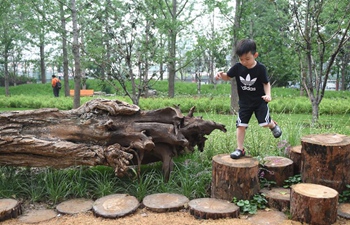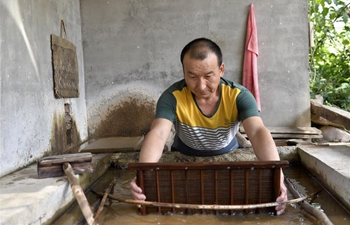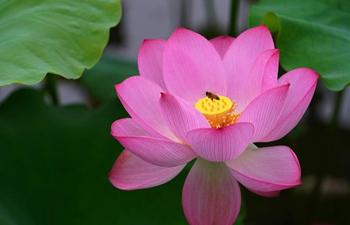HAIKOU, July 24 (Xinhua) -- Wang Fuhe's collection of over 1,000 antique lamps have finally found a home in a newly built museum in south China's Hainan Province.
His collection ranges from jade lamps created during the Han Dynasty (202 BC-220 AD) and the only known fishing lamp dating back to the Song Dynasty (960-1276) to the first electric lamp in Hainan.
Wang, 61, has put together the collection over the past 50 years.
As the grandson of a fisherman and son of one of China's first generation of electricians, a profession he also followed, Wang's life has been full of stories about lights and lamps.
In the 1910s, an electric power company in the city of Haikou imported a diesel generator from Britain. An electric lamp installed in the generator room is believed to have been the first electric light in Hainan.
When the company moved away in 1939, Wang's father was one of the staff who took down the lamp so that it could be preserved. His father frequently talked about the lamp and it lingered in Wang's mind.
"I always wondered what the first lamp looked like. Would I ever be able to find it?" Wang said. After numerous trips across the province searching for the lamp, an elderly collector gave it to him as a gift.
Some of the Wang's collection was found amongst discarded trash, while other pieces were bought from antique markets at high prices. He knows the story of every lamp in his collection by heart.
"This was passed on by my grandmother. She purchased it from Southeast Asia," said Wang, pointing at a silver lamp with a combination of Chinese and Western elements -- an Aladdin oil lamp with the head of a crane which signifies longevity in China.
"Thanks to the affluence of the maritime silk road, fishermen or business people brought these lamps to Hainan, one of the major ports along the route," Wang said.
The most common lamps in the museum are begonia lamps which have historical and cultural value for Hainan. The seed of the begonia is flammable, and people would extract its oil or burn it directly to produce light.
Both the flowers and oil of begonia plants give out a light fragrance when lit, which helps prevent moss from growing on walls and repel insects.
"This begonia lamp is very unique with a frog standing on a leaf. In Chinese, the phrase 'frog on a leaf' sounds similar to 'having a baby.' The phrase symbolizes fertility," Wang said.
"Small lamps once lit up people's lives and represent the culture of different times. Being able to understand a time in history and its culture through a lamp brings me immense joy," Wang explained about his obsession with lamps.
After retiring from his job at China Southern Power Grid, Wang is not rich but he rejects any request to sell his lamps.
The item which Wang treasures most is a ceramic fishing lamp from the Song Dynasty.
"This lamp is the most special to me and the only one left in China," Wang said. "It was hung on top of a boat by fishermen in the past, and is waterproof and fire-resistant."
Once a buyer wanted to exchange it for a luxury car, but Wang rejected the offer without hesitation.
"My father and I spent our lives collecting lights, so they cannot be given a monetary value," he said. "They tell the stories of people from the past and record the development of society."
Wang's house was full of lamps, he even stored some in his relatives' houses. Many people could not understand why he liked collecting what they saw as trash.
He wanted to donate his collection to a museum because his children didn't share his passion for the lamps. This wish became stronger after he was diagnosed with cancer five years ago.
Wang has visited numerous museums over the years but none of them would take all the lights. "Only by keeping the whole collection together can we tell the complete story of lamps and lights of Hainan," he said.
Early this year, the Haikou branch of the China Southern Power Grid decided to build a lamp museum for Wang's collection to preserve the stories behind modern electricity and the history of Chinese lights.
The second phase of the construction was completed in July and Wang has now moved his entire collection there.
Walking into the exhibition hall, he emphasized the social value of the lights. "They should not be owned by one person alone, only by displaying them for the public can we pass on Hainan's history and culture."
















